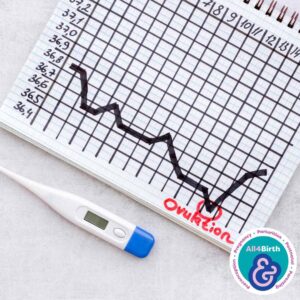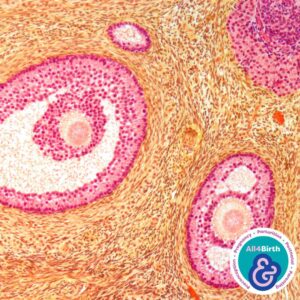Dr. Anna Byrom
Founding Director, CEO, All4Maternity
@acbmidwife @All4Birth
What is Heavy Menstrual Bleeding?
Heavy menstrual bleeding (HMB) is a common condition that affects many women and people who menstruate. It can cause significant disruptions to daily life and may lead to iron deficiency anaemia (IDA), impacting overall health. Seeking personalised care from healthcare professionals is crucial to understanding the causes, symptoms, and treatment options available.
Recognising the Symptoms
HMB is defined as menstrual bleeding that is self-defined as excessive and interferes with quality of life. This can include:
- Bleeding lasting more than 8 days
- Frequent periods (less than 24 days apart)
- Large blood clots or needing to change pads/tampons frequently
- Flooding (soaking through clothes despite using menstrual products)
- Symptoms of anaemia – fatigue, dizziness, shortness of breath, pale skin
Important: Heavy periods can occur with or without a specific diagnosis. If your period affects your well-being, seeking medical assessment and advice is worth it.
Common Causes of Heavy Menstrual Bleeding
The FIGO PALM-COEIN classification helps identify the causes of abnormal uterine bleeding:
Structural Causes (PALM)
🩸 P – Polyps (non-cancerous growths in the uterus)
🩸 A – Adenomyosis (endometrial tissue growing into uterine muscle)
🩸 L – Leiomyomas (fibroids)
🩸 M – Malignancy or hyperplasia (cancerous or pre-cancerous conditions)
Non-Structural Causes (COEIN)
🩸 C – Coagulopathy (e.g., bleeding disorders like von Willebrand disease)
🩸 O – Ovulatory dysfunction (e.g., PCOS, thyroid conditions)
🩸 E – Endometrial dysfunction
🩸 I – Iatrogenic causes (e.g., side effects of IUDS or blood thinners)
🩸 N – Not yet classified (ongoing research)
Other factors: Obesity, chronic inflammation, and stress may contribute to abnormal bleeding.
Why Does Heavy Bleeding Matter?
HMB is often under-reported because it is normalised in many communities. However, it can have a major impact on health:
🔴 Increased risk of iron deficiency anaemia (IDA) – affecting up to 60% of people with HMB
🔴 Physical symptoms – breathlessness, fatigue, paleness
🔴 Emotional & social impact – anxiety, missed work or school, disrupted daily life
🔴 Higher risk during pregnancy – people with pre-pregnancy IDA may have complications
Did you know? Iron deficiency anaemia affects 30% of people who menstruate worldwide.
How Can Heavy Bleeding Impact Childbearing?
If you experience heavy menstrual bleeding, it can affect fertility, pregnancy, and postpartum health. Many of the implications are linked to HMB’s underlying causes or consequences. Key concerns include:
| Pre-Pregnancy & Fertility | Pregnancy & Birth | Postpartum Recovery |
| 🔹 Hormonal imbalances (such as PCOS or thyroid dysfunction) that cause HMB may also affect ovulation and conception. 🔹 Uterine conditions like fibroids or adenomyosis can interfere with implantation and increase the risk of miscarriage. 🔹 Chronic anaemia due to HMB can reduce overall energy levels, affecting reproductive health and wellbeing. |
🔹 Iron deficiency anaemia (IDA) is common in people with HMB and increases risks such as: ✔ Preterm birth ✔ Low birth weight ✔ Increased need for blood transfusions after birth 🔹 Conditions like polyps or fibroids may increase the chance of operative birth, such as caesarean section. |
🔹 If IDA is untreated before pregnancy, postpartum fatigue and recovery may take longer. 🔹 People with a history of HMB may experience more excessive postpartum bleeding (postpartum haemorrhage). |
Key Tip: If you’re trying to conceive or are pregnant, speak with a midwife or doctor to manage your iron levels and underlying conditions.
What Can You Do?
🔹 Talk to a healthcare provider – They can help identify the cause of your HMB and recommend treatment.
🔹 Track your symptoms – Note how often you need to change pads/tampons and any clot size.
🔹 Check for signs of anaemia – Fatigue, dizziness, shortness of breath, and pale skin could indicate low iron levels.
🔹 Consider treatment options – These may include iron supplements, medication, hormonal treatments, or surgical options for severe cases.
🔹 Self-care strategies – Rest, balanced nutrition, and staying hydrated can help support your body.
Key Action Steps:✔ Recognise how HMB affects your quality of life |
Conclusion
Heavy menstrual bleeding is not just an inconvenience—it’s a medical condition that deserves attention. If you or someone you know experiences significant menstrual blood loss, it’s important to seek support and explore treatment options. Midwives and health professionals can play a key role in raising awareness and improving access to care for those affected by HMB.
Want to learn more? Browse All4Birth for expert insights, support, and guidance.
This fact sheet has been developed using the Topic Highlight from All4Maternity.com published in The Practising Midwife journal, March 2025 Issue (DOI: https://doi.org/10.55975/DMHJ3273) and using generative AI to adapt the content for a family-focused fact sheet.
Links to other resources
 Books
Books
Heavy Menstrual Bleeding: Pathophysiology, Management, and Clinical Insights by Dr. Eugenia Spineanu
 Film, Audio and Apps
Film, Audio and Apps
- “Women’s Health: Heavy Menstrual Bleeding” by RCGP CIRC Podcast: Dr. Toni Hazell and Dr. Anne Connolly
- “What You Should Know About Heavy Menstrual Periods” by Cleveland Clinic Health Essentials Podcast
- “7-2-1: All You Need to Know About Periods” by the Foundation for Women & Girls with Blood Disorders
- “Episode 42: Heavy Menstrual Bleeding” by The Uterine Sound Podcast
 Websites and Guidelines
Websites and Guidelines
Talking Red by The Haemophilia Society
- NICE Guideline NG88 provides comprehensive recommendations on assessing and managing heavy menstrual bleeding.
- ACOG’s Practice Bulletin on Management of Abnormal Uterine Bleeding Associated with Ovulatory Dysfunction offers detailed guidance for healthcare providers
- RANZCOG’s Heavy Menstrual Bleeding Clinical Practice Guideline outlines evidence-based recommendations for managing HMB.














